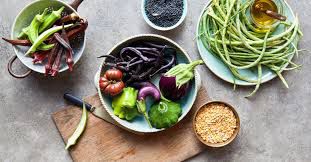ARTICLES
Alcohol-Free Diet Plan for Liver Recovery
Alcohol-Free Diet Plan for Liver Recovery

If your liver has been through months or years of alcohol exposure, it’s time to help it recover. The liver is one of the few organs that can regenerate, but it needs proper fuel and care to do so. Removing alcohol is the first and most important step—but what you eat next is what determines how fast and how well your liver heals.
This alcohol-free diet plan isn’t about starving yourself or obsessing over every calorie. It’s about giving your liver exactly what it needs to flush out toxins, repair damaged cells, and rebuild strength. Here’s how to build meals that actively support liver recovery—one bite at a time.
1. Start Your Day With Liver-Friendly Breakfasts
Mornings set the tone for your entire day, and a balanced breakfast can help stabilize blood sugar, reduce cravings, and kick-start liver function. Choose high-fiber options like oatmeal made with plant-based milk, topped with blueberries, flaxseeds, and a sprinkle of cinnamon. Whole-grain toast with avocado and a poached egg is another smart choice. Both options offer antioxidants, healthy fats, and key nutrients that reduce inflammation and support detox. Avoid processed cereals, sugary pastries, and fried breakfast items—they overload your liver when it’s just getting started.
ALSO READ: Natural Ways to Improve Liver Enzyme Levels
2. Include Leafy Greens in Every Lunch
Lunch is a prime opportunity to flood your system with liver-loving nutrients. Leafy greens like kale, spinach, and arugula contain chlorophyll, which binds to heavy metals and aids toxin removal. They also increase bile production, helping your liver process fats efficiently. Pair your greens with grilled chicken or salmon, quinoa, and olive oil–based dressing. Adding beets, carrots, or cucumbers can provide extra antioxidants and fiber to sweep waste from your system. Try to avoid creamy dressings, fried toppings, or canned meats. Stick to fresh, whole ingredients.
3. Choose Anti-Inflammatory Dinners
Dinner should focus on calming your body after a long day and helping your liver reset overnight. Wild-caught fish like mackerel or sardines offer omega-3 fats that reduce liver inflammation and prevent fat buildup. Combine them with roasted broccoli, cauliflower, or Brussels sprouts and sweet potato for a satisfying, nutrient-rich meal.
Plant-based meals like lentil stew, quinoa-stuffed bell peppers, or chickpea curry also support liver healing and digestion. Stick to unprocessed ingredients, and use herbs like turmeric, garlic, and ginger for added detox support.
4. Stay Hydrated With Detox-Boosting Drinks
Water is essential for liver recovery, especially when flushing out lingering alcohol-related toxins. Aim for at least 8 to 10 glasses of water daily. Infuse your water with lemon, cucumber, mint, or apple cider vinegar to encourage bile flow and support your metabolism. Unsweetened green tea is another great option—it contains catechins that protect liver cells and help normalize enzyme levels. Avoid soda, energy drinks, and sugary juices. These beverages spike blood sugar and force your liver to work harder.
ALSO READ: Foods That Help Cleanse and Protect the Liver
5. Snack on Foods That Heal
Smart snacking can keep your metabolism steady and prevent blood sugar crashes that strain the liver. Opt for snacks that are low in added sugar and high in nutrients. Sliced apples with almond butter, carrot sticks with hummus, unsalted nuts, or a boiled egg are all great options. These choices offer fiber, protein, and healthy fats to keep your liver supported between meals. Avoid processed snack bars, chips, or candy. They contain artificial ingredients and trans fats that your liver has to filter out.
6. Focus on Whole Foods—Not Processed Ones
Whole foods are loaded with vitamins, minerals, and fiber that support detoxification. Processed foods, on the other hand, are often stripped of nutrients and filled with additives that burden your liver. Stick to foods as close to their natural state as possible. Cook your own meals, read ingredient labels, and choose fresh or frozen produce over canned or boxed options. Each small step adds up and gives your liver less junk to process.
7. Eat Smaller Portions More Frequently
Large, heavy meals can overwhelm the liver and slow down detox processes. Eating smaller meals every 3 to 4 hours helps your liver stay efficient while keeping blood sugar steady. You don’t have to count calories—just aim to stop eating when you’re satisfied, not stuffed. This helps reduce fat accumulation in the liver and keeps enzyme levels stable.
ALSO READ: Best Liver Detox Drinks Backed by Experts
8. Load Up on Fiber
Fiber binds to toxins and helps carry them out of your body through the digestive tract, giving your liver less to clean up. Aim for at least 25 to 30 grams of fiber per day. Beans, lentils, chia seeds, pears, berries, oats, and brown rice are excellent sources. Including fiber-rich foods in every meal can reduce cholesterol, support digestion, and ease the liver’s workload.
9. Avoid Sugar and Refined Carbs
Sugar and refined carbohydrates convert to fat in the liver, contributing to fatty liver disease. During liver recovery, it’s important to cut out sodas, white bread, pastries, candy, and most packaged snacks. Replace them with whole grains like quinoa, millet, and brown rice, or naturally sweet options like dates, figs, or a piece of dark chocolate (70% cocoa or more). These alternatives won’t spike your blood sugar the same way—and they’re easier on your liver.
ALSO READ: How to Reverse Fatty Liver with Lifestyle Changes
10. Limit Animal Fats and Fried Foods
Saturated fats from red meat, butter, and fried foods are tough on a recovering liver. These fats can increase inflammation, raise cholesterol, and add to liver fat storage. Choose lean protein sources like beans, fish, tofu, or organic chicken instead. Cook with olive oil or avocado oil and use methods like baking, steaming, or grilling instead of deep-frying.
11. Add Liver-Supportive Herbs and Spices
Certain herbs and spices have been used for centuries to support liver function. Turmeric reduces inflammation, milk thistle aids cell regeneration, ginger improves digestion, and dandelion supports bile flow. Use these herbs fresh or in dried form as part of your daily cooking. You can also drink them as teas or take them as supplements—but always check with a healthcare provider before starting new herbs, especially if you’re on medications.
12. Stick With It for the Long Term
Liver recovery isn’t an overnight fix. While removing alcohol makes a major difference, your long-term eating habits are what determine whether the damage heals—or gets worse. Stay consistent with your alcohol-free meals. Prioritize whole foods, stay active, manage stress, and give your liver the time it needs to regenerate. Many people start to see enzyme levels improve and symptoms fade within weeks.
ALSO READ: Signs Your Liver Is Not Functioning Properly

 POLYTECHNIC NEWS8 hours ago
POLYTECHNIC NEWS8 hours agoRelief for Students as Gov. Umo Eno Approves 18 Speed Bumps, Road Signs Around Akwa Ibom Poly After SUG Intervention

 POLYTECHNIC NEWS13 hours ago
POLYTECHNIC NEWS13 hours agoPHOTOS: OSCOTECH Esa Oke Poly Students Celebrate First-Ever Ojude Oba in Grand Style

 Admission8 hours ago
Admission8 hours agoDelta State Maritime Polytechnic Burutu Opens Admission Into ND/HND Programmes for 2025/2026 Academic Session

 ASUP8 hours ago
ASUP8 hours agoASUP rejects outsourcing of quality assurance in polytechnics

 Admission8 hours ago
Admission8 hours agoFederal College of Forestry, Jos Announces Admission Into ND, HND and Vocational Programmes for 2025/2026 Session

 POLYTECHNIC NEWS12 hours ago
POLYTECHNIC NEWS12 hours ago30 Years After Graduation, Osun Poly Alumni Executives Return to Campus, Pledge Support for Institution’s Growth

 POLYTECHNIC NEWS7 hours ago
POLYTECHNIC NEWS7 hours agoPHOTOS: Plateau State Polytechnic Students Mark Final Year Week in Style

 EDUCATION8 hours ago
EDUCATION8 hours agoHackers Reveal How CBT Centres’ Servers Were Compromised During 2025 UTME




































